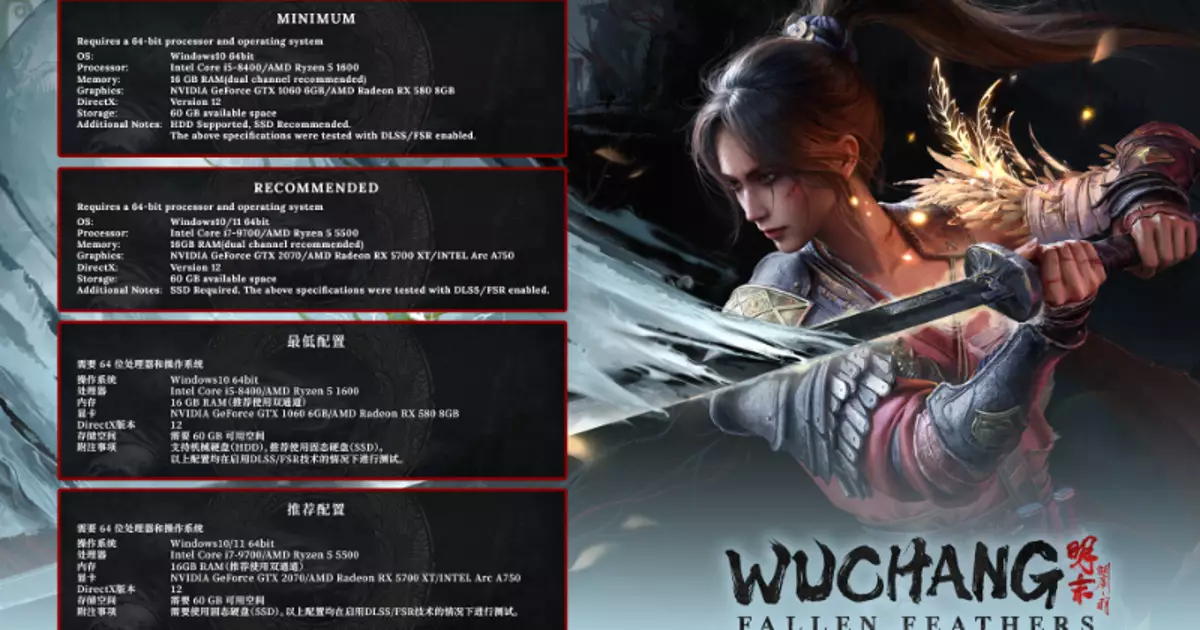In a landscape crowded with action RPGs, Wuchang: Fallen Feathers stands out by intertwining traditional Chinese mythology with contemporary game design. Its premise is compelling: a post-plague realm where feathers symbolize both corruption and a mysterious magic system. At its core, the game crafts a world bitterly reminiscent of Bloodborne, yet it boldly attempts to forge a unique identity—setting itself in Shu, a city ravaged by a feathered affliction. While comparisons are inevitable, they serve as a benchmark for quality rather than a crutch. The game’s premise promises a dark, intense experience where players take on the role of a amnesiac pirate swordswoman caught in a conflict that blurs the line between humanity and monstrosity. The core intrigue lies in its narrative mystery and the player’s agency to shape multiple endings through choices made during gameplay.
Visual Evolution and Artistic Ambitions
Initially described as a ‘Bloodborne with a Chinese twist,’ Wuchang has evidently matured visually since its early days. The developers, Leenzee, seem committed to distancing the game from overly familiar horror tropes, adjusting visuals to reflect Shu’s culture and mythos more authentically. This shift from a blood-red Yharnam-like environment to something less monochromatic hints at an artistic ambition that prioritizes cultural authenticity and atmospheric depth. While the core motif of feathered monsters echoes FromSoftware’s design ethos, Wuchang’s aesthetic aims to evoke a distinctly Chinese legend-inspired setting—more than mere homage; it’s an effort to explore a myth-rich universe filled with richly textured characters and environments.
Gameplay Mechanics That Entice
One of the game’s most enticing elements is its combat system, which appears to blend melee, magic, and strategic upgrades seamlessly. The concept of using “Red Mercury” to unlock new techniques injects a sense of gritty resourcefulness—implying a dangerous world where crafting and scavenging are vital. Weapon enchantments that escalate damage provide a tangible sense of progression, and the inclusion of boss fights suggests a relentless challenge designed to test skill and reflexes. Furthermore, the narrative promises meaningful player choices affecting story outcomes, encouraging repeated playthroughs to explore different paths and secrets. Such depth indicates a game committed to player agency rather than linear storytelling, which could bolster its longevity.
Technical Demands and Future-Ready Graphics
Concerning system requirements, Wuchang’s specifications are quite reasonable, especially considering its visual ambitions. Minimum requirements—an Intel Core i5-8400 or AMD Ryzen 5 1600 paired with a GTX 1060—are accessible to many enthusiasts, ensuring a broad audience can experience the game without owning top-tier hardware. However, the recommended specs—featuring an Intel Core i7-9700 or Radeon RX 5700 XT and an RTX 2070—highlight the game’s potential for high-fidelity graphics, especially with support for DLSS 4 technology. This suggests that Wuchang aims to leverage modern GPU features to deliver smoother performance and enhanced visual effects, making it not just a foray into mythology but a technical showcase as well. Such advancements could redefine player expectations within the genre, pushing developers to pursue more immersive and visually rich experiences.
Personal Reflections and Broader Implications
As someone increasingly critical of formulaic genre entries, I see Wuchang as a breath of fresh air—an opportunity to challenge the stagnation often seen in action RPGs. Its cultural specificity and focus on narrative choices are commendable, even if the game’s roots nod toward familiar designs. The emphasis on a mythically charged world filled with monstrosities offers a mature, nuanced experience that might appeal to fans weary of being churned through repetitive quests. Yet, I remain cautious—visual and mechanical innovation alone do not guarantee a groundbreaking experience. The true test will be in how well it marries its ambitious storytelling with gameplay that is both challenging and rewarding. If executed well, Wuchang could inspire a new wave of culturally rich, emotionally compelling action games that push the boundaries of genre convention, turning traditional myth into a modern interactive masterpiece.

